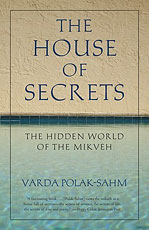In Judaism, a mikveh is a bath designed for the purpose of ritual immersion. The word as used in the Hebrew Bible literally means a "collection" — generally, a collection of water. Varda Polak-Sahm is a seventh-generation Jerusalemite, the author of three books, and an internationally known photographer and researcher of folklore. The House of Secrets is based on ten years of research in various mikvehs in Israel and expresses the views of an impressive crosscut of Jewish women, young and old, Moroccans and Yemenites, Sephardics and Ashkenazis. The result is a compelling examination of the nature and meaning of this ritual which has remained clouded with mystery and secrecy for centuries.
Varda Polak-Sahm is a secular Israeli Jew who grew up in a traditional home. The hidden world of the mikveh is where "the rites of purity, sexuality, and fertility are performed by women for women, Jewish women . . . It serves Jewish women who come to cleanse themselves of their menstrual blood and ready themselves to have sexual relations with their husbands." Polak-Sahm comes to the mikveh seeing it as symbol of the intrusion of the religious establishment into the private domain. But she discovers through her own experience of immersion in the waters that it can be a deeply sensuous and spiritual happening.
Her interviews with the balaniyot (the women who preside over the immersions) touch upon the ultra-orthodox interpretations of women, sexuality (only kosher when connected to fertility), marriage, rituals, curses on females, and God's wrath. Many of them enforce strict rules such as no single women, divorcees, widows, or women from other religions. Polak-Sahm salutes the idea that the mikveh is a "female temple" into which men have no entry. Given the exclusion of women from all public religious activity, it is the one place where they can connect with their Creator, their bodies, and the camaraderie of other women as they make the transition from virgin to wife. In a very positive paragraph, the author states:
"The relationship between the woman and God inside the mikveh is described as an intimate symbiosis. The moment of immersion is a woman's private moment of communion with her self, with her body, with her soul, and with the spark of the divine that resides within her."
Polak-Sahm also discusses customs in the mikveh — the henna ceremony and the eating of the torte cake.
